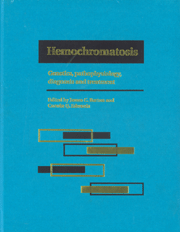Book contents
- Frontmatter
- Contents
- List of contributors
- Foreword
- Part I Introduction to hemochromatosis
- Part II Genetics of hemochromatosis
- Part III Metal absorption and metabolism in hemochromatosis
- Part IV Diagnostic techniques for iron overload
- Part V Complications of iron overload
- 21 Mechanisms of iron toxicity
- 22 Iron as a carcinogen
- 23 Clinical spectrum of hepatic disease in hemochromatosis
- 24 The arthropathy of hemochromatosis
- 25 Diabetes mellitus and hemochromatosis
- 26 Non-diabetic endocrinopathy in hemochromatosis
- 27 Cutaneous manifestations of hemochromatosis
- 28 Cardiac abnormalities in hemochromatosis
- 29 Estimate of the frequency of morbid complications of hemochromatosis
- 30 Juvenile hemochromatosis
- Part VI Therapy of hemochromatosis and iron overload
- Part VII Infections and immunity in hemochromatosis
- Part VIII Hemochromatosis heterozygotes
- Part IX Relationship of hemochromatosis to other disorders
- Part X Animal models of hemochromatosis and iron overload
- Part XI Screening for hemochromatosis
- Part XII Hemochromatosis: societal and ethical issues
- Part XIII Final issues
- Index
22 - Iron as a carcinogen
from Part V - Complications of iron overload
Published online by Cambridge University Press: 05 August 2011
- Frontmatter
- Contents
- List of contributors
- Foreword
- Part I Introduction to hemochromatosis
- Part II Genetics of hemochromatosis
- Part III Metal absorption and metabolism in hemochromatosis
- Part IV Diagnostic techniques for iron overload
- Part V Complications of iron overload
- 21 Mechanisms of iron toxicity
- 22 Iron as a carcinogen
- 23 Clinical spectrum of hepatic disease in hemochromatosis
- 24 The arthropathy of hemochromatosis
- 25 Diabetes mellitus and hemochromatosis
- 26 Non-diabetic endocrinopathy in hemochromatosis
- 27 Cutaneous manifestations of hemochromatosis
- 28 Cardiac abnormalities in hemochromatosis
- 29 Estimate of the frequency of morbid complications of hemochromatosis
- 30 Juvenile hemochromatosis
- Part VI Therapy of hemochromatosis and iron overload
- Part VII Infections and immunity in hemochromatosis
- Part VIII Hemochromatosis heterozygotes
- Part IX Relationship of hemochromatosis to other disorders
- Part X Animal models of hemochromatosis and iron overload
- Part XI Screening for hemochromatosis
- Part XII Hemochromatosis: societal and ethical issues
- Part XIII Final issues
- Index
Summary
Introduction
Data from human and in vivo and in vitro experimental studies strongly support a role of iron in initiation and promotion of carcinogenesis. This chapter reviews these data and discusses the putative mechanisms whereby iron may act as a carcinogen.
Evidence that iron is involved in carcinogenesis
Human data
Studies performed in the general population and in selected non-hemochromatosis groups suggest that elevation of body iron stores is associated with a moderately increased risk of cancer. Otherwise, a high risk of primary hepatic cancer, especially hepatocellular carcinoma, is well-documented in hemochromatosis patients. Large cohort studies have been performed to test for an association between abnormalities of serum iron tests and risks of cancer occurrence and cancer-related mortality (Table 22.1). All but one have concluded that there is a slight to moderate increase in these risks in persons with high serum transferrin saturation or total serum iron-binding capacity. Thus, elevation of body iron stores is associated with increased risks of cancer occurrence and death.
However, these results and conclusions must be interpreted with caution due to the unreliability of serum iron tests in reflecting body iron stores accurately. Day-to-day variations of serum iron concentration, total iron-binding capacity and transferrin saturation were not taken into account all studies relied on a single determination of serum iron test(s). In addition, confounding factors leading to a decrease or an increase in the values of serum iron tests were not always sought. Important causes of disturbance of serum iron test values without modification in total body iron stores, such as inflammation, bleeding, alcoholism, and hepatic disease were not considered systematically when results were interpreted, introducing further uncertainty about the conclusions of the studies.
- Type
- Chapter
- Information
- HemochromatosisGenetics, Pathophysiology, Diagnosis and Treatment, pp. 239 - 249Publisher: Cambridge University PressPrint publication year: 2000
- 6
- Cited by



